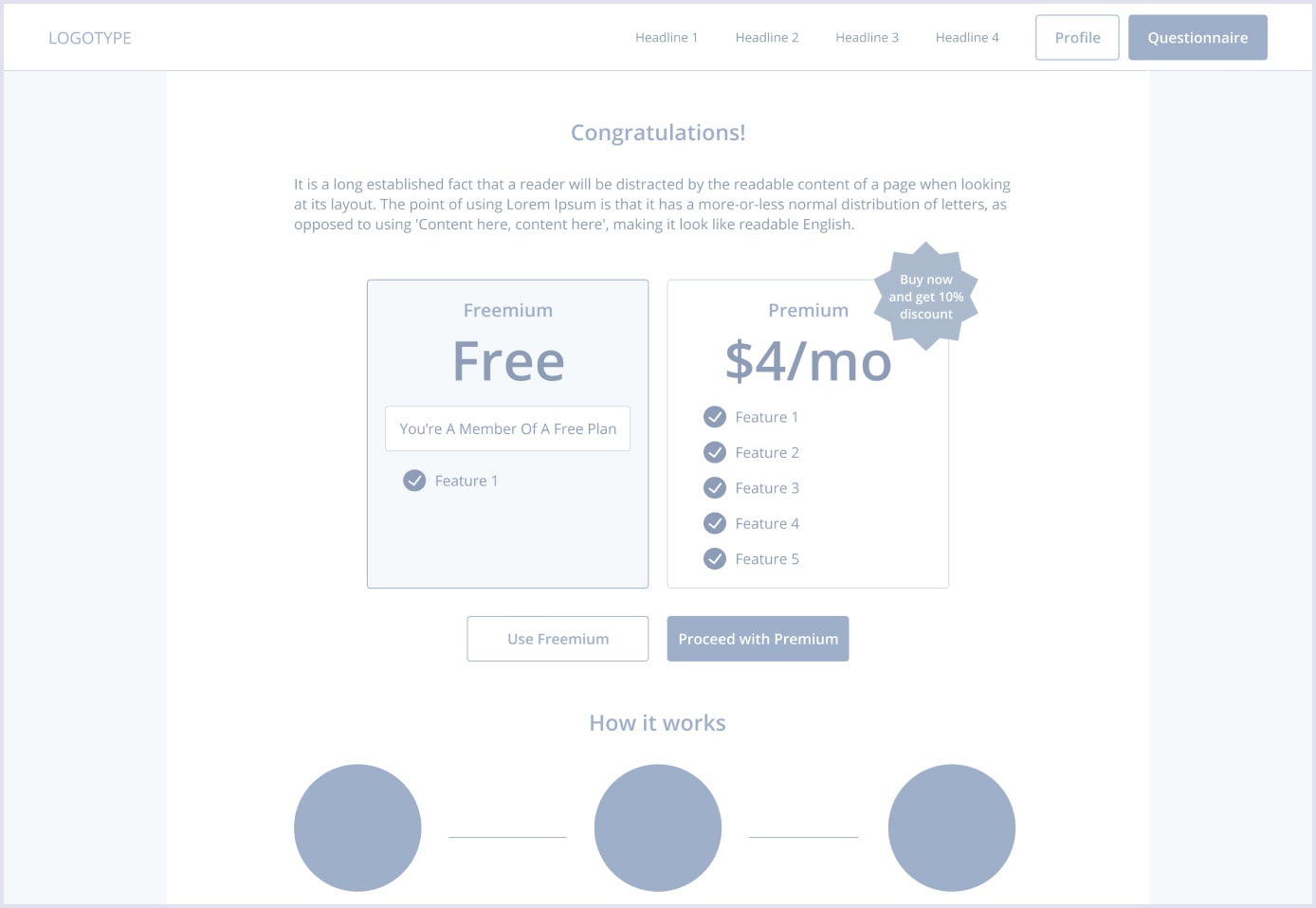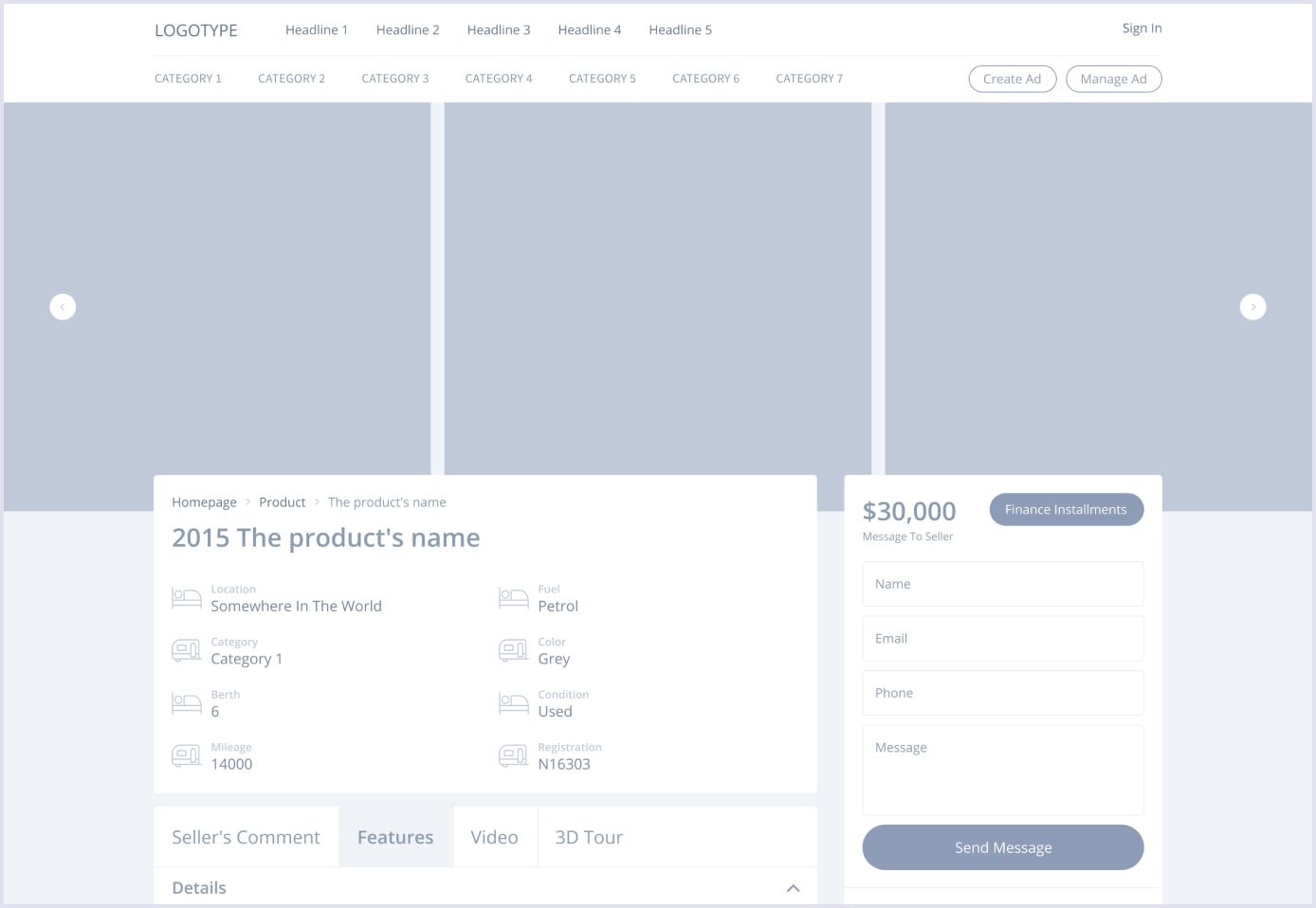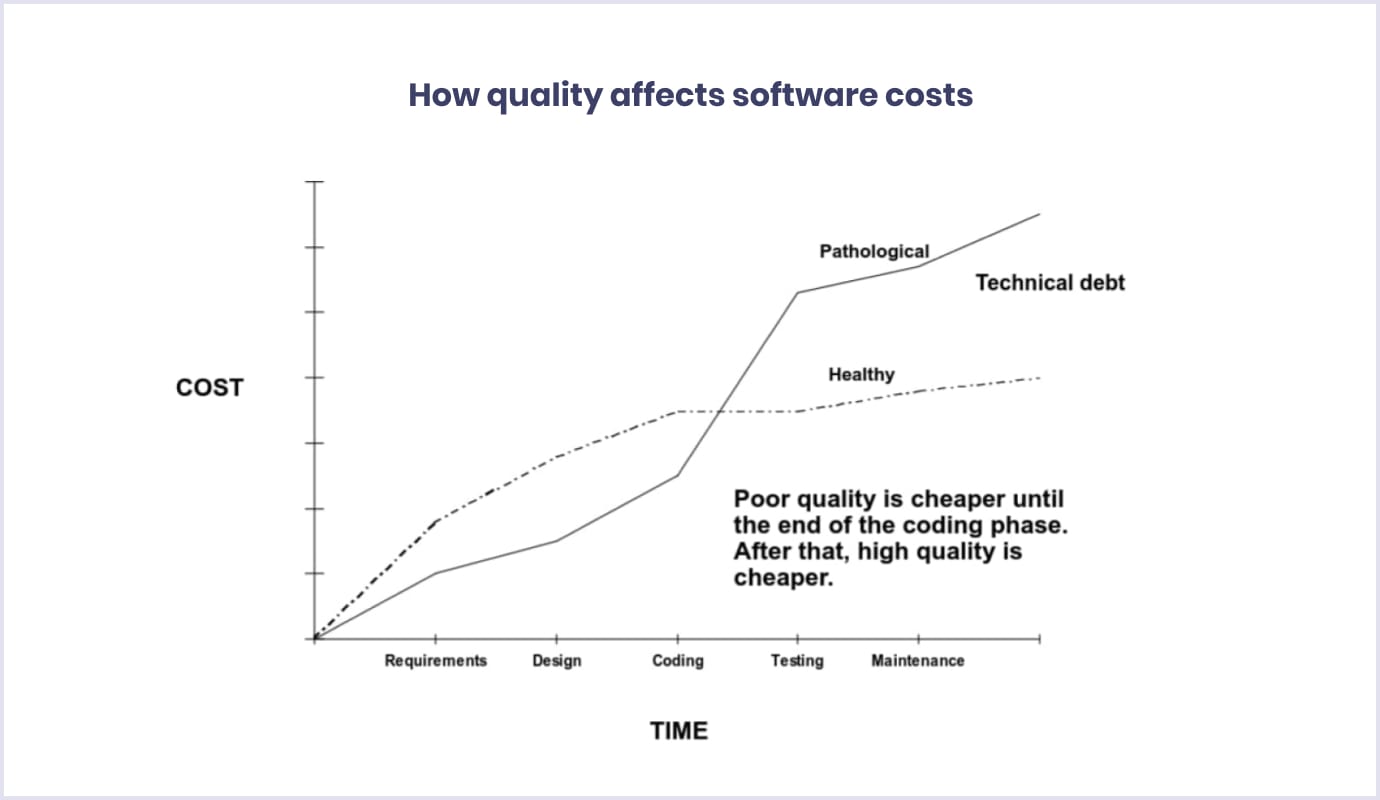“Ideas are easy. Implementation is hard”. And expensive, we should say. If you have ever tried to build a working software solution from scratch, you know a thing or two about it. Custom software development costs indeed may seem extremely high for startups with a tight budget.
In reality, the situation is not as hopeless as you may think. There are several ways to reduce custom software development costs. We will discuss them in this article.
6 smart ways to minimize the costs of custom software development
1. Ensure good planning
You cannot construct a building without a planned out structure or set on a journey without a map. In the same way, it will be too risky to get wrapped up in custom software development for startups without a well-prepared business plan. You may lose sight of the big picture and neglect important project details that will keep your startup away from success.
To start with, define the key objectives you expect to achieve. Keep in mind financial, brand, and product goals. When you understand each of them, you will easily sort out priorities and reach your destination much faster. Besides, a clear plan will help you identify areas where you can reduce custom software costs.
An example below by Instamojo shows how a business plan should look like and what information you should mention there.

Suppose all objectives have been set. Now the question arises of how you can track your progress. The answer is to use the right key performance indicators (KPIs) and metrics. They reflect the state of your startup. By analyzing the key indicators you will see whether you are on the right track or your startup’s performance is far from perfect.
So what metric should you choose? The rule is to focus on those indicators that make sense for your startup. That is when you will get the most meaningful and relevant results.
If you do not know where to start, we recommend that you proceed from the following KPIs:
- Customer Acquisition Cost;
- Customer Churn Rate;
- Customer Lifetime Value;
- Monthly Recurring Revenue;
- Daily Active Users.
Further reading: How to Build a SaaS Startup in 10 Smart Steps
2. Set clear requirements
Suppose you decided to turn to a software development company. We recommend holding a discovery session with their specialists. It is a meeting with the software development team aimed at defining your primary business needs and project requirements.
Based on our experience, we can point out the following advantages of the discovery session:
- The potential bottlenecks are identified, and high-level solutions to potential issues are found.
- You get time and cost estimates along with project documentation.
- You and the team get a better understanding of the project scope.
- The main functions and user flow of your future app become clear.
- Helps you build relationships with your software development partner, and make sure that you made the right choice.
How can you prepare for a discovery session? Your main task is to define the key requirements for your future product. This way, you will find no difficulties in delivering your project idea to the custom software development company.
Remember that the clearer your requirements are, the more accurate time and cost estimate you will get. An accurate cost estimate, in its turn, will help you understand how much money you will need for your custom software development project.
Another reason to keep your requirements as concise as possible is to avoid ambiguity. Your task is to make sure that all engaged parties are on the same page. Otherwise, misinterpretations can result in chaotic design and improper functionality.
Consequently, the technical team engaged in software development for your startup will have to redo the project work. The whole venture may end up a complete disaster for your project. It is particularly true for startups with a tight budget and wondering how to reduce custom software development costs.
You may also like: How to Build a SaaS Product: Step-by-Step Guide
3. Begin with a Minimum Viable Product
It will cost you an arm and a leg to build all functionality of your product at once. For this reason, prioritize your features and create a minimum viable product first. The MVP approach is very popular among startups wondering how to reduce custom software development costs.
The main advantages of building an MVP during custom software development for startups are as follows:
- Cost reduction;
- Shorter time-to-market.
The central meaning of this term is reflected in its name. A minimum viable product or MVP for short is a product with very basic functionality that is built to test the feasibility of your business idea. Still, it is a working solution that customers may use.
The core benefits of building an MVP for startups are cost reduction and shorter time-to-market. Since you build a product with limited functionality, the software development company will need less time to complete it. Consequently, the cost of their services will be less expensive. Besides, you will be able to present your software solution to your potential customers much faster.
Their feedback is vital since it will define the future of your project. You will find out whether your business idea is worth investing in or it is better to give up the whole venture. Also, you will see how your product should be modified to satisfy your target audience.

Proof of concept vs prototyping
Apart from a minimum viable product, there are two more terms related to custom software development we need to discuss. These are proof of concept and a prototype.
What is so important about them? Both of these terms focus on the functionality of your future product, albeit in a different manner.
Proof of Concept (POC) is used to test a design idea or prove that the certain functionality of your product can be developed further.
A prototype, in its turn, helps visualise how your application will function. It gives you a basic idea of its design, layout, and navigation. This way, we can consider it the right attempt at building a working model.
In other words, the proof of concept proves that some functionality can be built and the prototype shows how exactly it can be implemented.
Below you see the examples of marketplace prototypes created by Codica team.
The first one is a prototype for the e-commerce platform selling online courses for children.

The second prototype was built for an online marketplace selling trailers.

Further reading: Minimum Viable Product vs Prototype: What’s Best to Validate Your Business Idea
4. Start testing at an early stage
The rule of thumb is to start testing software for startups at the early stages of the custom software development cycle. This way, you will avoid the situation when errors or bugs are accumulated, and you will have to pay extra money to get the project work redone.
Rework, in its turn, will force you to push the release date back, perhaps more than once. As a result, you risk losing the competitive advantage when launching your product later than competitors.
At the same time, by performing regular tests, you will be able to identify and fix issues before proceeding to other parts of the project. This way, you reduce app development costs for your startup by avoiding the need for site redesign or redevelopment.
Speaking about QA software testing services, we cannot but mention the importance of gaining early adopters. The sooner you will show your solution to the target audience, the faster it will be improved and developed into a full-fledged product.
Where can you find pioneer users for your product? We can say for sure that social channels work best. So do not hesitate and turn to Facebook and Linkedin groups, Quora answers or Reddit communities. Also, your personal network and different forums will be a good help.
You may also like: How to Calculate the Cost to Build a SaaS App in 2020
5. Use the Agile methodology
There are several startup software development methodologies. The most common approaches are Waterfall and Agile. Our Agile project experience gives us the full right to call it the best option in terms of reducing the costs of software development.
High flexibility
A great benefit of the Agile approach is that it always leaves room for changes, and you can quickly adapt to the changes in the market. Developers can add new functionality or make some iterations on each step of project development. The project backlog is adapted to the ongoing changes in business requirements, which helps deliver value much faster.
Cost-effectiveness
The great advantage of Agile is cost-effectiveness. You can reduce custom software costs significantly by evaluating your product on a regular basis. You make sure that the team engaged in software development for your startup builds only the required functionality. This way, you avoid paying extra money for excessive features.
Risk mitigation
Another benefit of the Agile methodology lies in early risk identification. It is much easier to manage separate iterations than to handle the whole project at one point. Any issues that may arise can be identified and tackled at the very beginning before the backtracking may become necessary.
Summing up, Agile improves the collaboration between the selected software development company and your organization. As a result, you increase your chances to get a unique high-quality software solution on time and budget.
6. Hire specialists offering development services for startups
It is high time to think about a development team that will build a software solution for you from scratch. You have three available options. You can hire developers for startups on freelance platforms like Upwork. Alternatively, you may create an in-house development team. Finally, you can use the services of a company experienced in custom software development for startups.
Let’s discuss each of these options. Soon you will know why the partnership with a custom software development company is the most cost-effective option.
Hiring freelancers
When it comes to custom software development, freelancers are the most affordable option. However, keep in mind that it comes with certain risks. For example, the low hourly rates may indicate the poor quality of services provided by individual contractors. This fact gives us every right to state that freelance is the most unreliable option of all.
The chart below shows how the quality of custom software development for startups impacts software costs.

Source: Nearshore.Perficient.com
Other cons of this approach are the lack of maintenance and support, organizational difficulties, and confidentiality concerns.
Building an in-house development team
With this approach, you get all developers and other specialists you need for your project in one place - inside your organization. In this case, you can expect high engagement. Since your in-house team will have a common goal, all their efforts will be directed to the project’s success.
Another benefit of this option is your overall control over the work of the in-house team.
Still, hiring in-house specialists will not work if you are looking for ways to reduce custom software costs. The thing is that maintaining an in-house team is a costly affair. When choosing this option, be ready for the following expenses:
- Salaries and compensations;
- Software licensing;
- Taxes;
- Holidays and sick leaves;
- Hardware.
Other issues that may arise are staff dismissal and lack of expertise in particular areas.
Hiring a company experienced in building MVPs for startups
Now we are getting to the last but not least option which can help your startup save money. This approach allows business owners to get a skillful and experienced team with no need to invest in its efficiency.
So what are the pros of hiring a company that offers MVP development services for startups? Let’s find out!
- Vast experience
When it comes to building a software solution from scratch, expertise plays a major role in your future success.
Established agencies can provide you with a full-cycle development team for your startup. It consists of developers, UI/UI designers, project managers, and QA engineers. All these specialists have vast experience in building high-quality MVPs for startups. They will consider the specific nature of your domain and the challenges your startup may face. As a result, you will get a unique software solution that will fit your particular business needs.
- Cost-effectiveness
As we have said before, software development for startups can be rather expensive for companies with in-house tech teams. In its turn, a partnership with an experienced company allows reducing costs of MVP development services for startups. For example, you do not need to spend on recruiting, training, and retraining your employees. Similarly, you will not have issues with downtime costs or costs of replacement.
Thus, we can say for sure that this approach facilitates cost savings in software development.
- After-launch maintenance and support
Your partnership with the company engaged in creating MVPs for startups does not end after the product launch. You can count on further maintenance and technical support 24/7.
Since developers are familiar with your custom software solution, they will easily handle any issues that may arise. Such an agency would be a good help if you decided to do without an in-house tech team.
Codica’s expertise in custom software development for startups
Since 2015, Codica has been helping startups thrive by building custom software solutions for them. Over the years, we have been helping our clients grow their business by building exceptional custom software for startups.
We believe that each project has the potential to become a game-changer. For this reason, you can count on our comprehensive support on each step of custom software development for startups.
Today, we want to share with you one of our projects, an insurance progressive web application.
Babel Cover is a technological startup that deals with early-stage insurance. The company is engaged in building personal insurance products. They aim at encouraging users to create risk-conscious profiles.

Our team was requested to develop a fast-loading and intuitive mobile app. The solution delivered should perform two important functions. The first one is to allow users to purchase insurance quickly and easily. The second function is to enable them to report an incident via their smartphones.
Having analyzed the project’s requirements carefully, our team decided to build a cross-platform progressive web application. As a dedicated insurance software development company, we are passionate fans of PWA technology. We firmly believe that it can speed up your MVP time-to-market significantly.
The thing is that going with the PWA supposes building the only one cross-platform application instead of separate versions for iOS and Android. Also, in such a way the PWA technology allows to save software development expenses. As a bonus, you don't have to wait for approval from App Stores.
All the above means that you can launch your minimum viable product much faster.
Additionally, a progressive web app offers a superb mobile experience. It means that users can access the app’s functionality even when the internet connection is weak or unstable.
Summing up, the MVP that Codica team delivered helped our client save time and budget, and the solution can be further scaled by adding new products.
Conclusion
Building a software product from scratch can become an expensive endeavour. This statement is particularly true for startups that do not know how to reduce custom software development costs. Hopefully, the tips and tricks discussed in this article will help you build a solution in an effective and cost-efficient manner.
At Codica, we understand that custom software development for startups can be a challenging task. And that does not stop us, but on the contrary, we enjoy meeting complex challenges and delivering robust software for startups. Do not doubt to contact our experts to talk about your projects and get a free quote.
